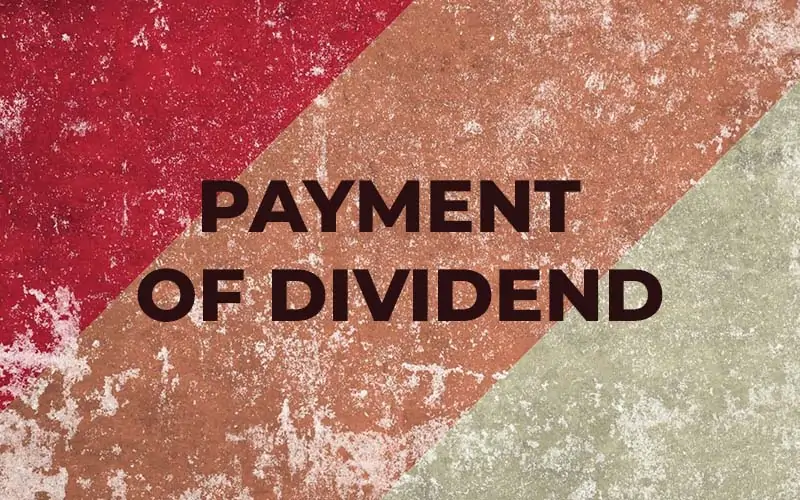State the Legal Provisions Relating to Payment of Dividend.

Dividend refers to that portion of the profits of a company which is allocated to the members of the company by a formal declaration in the annual general meeting of the company. In other words, it refers to the return on shares held by a member. According to Section 2(35), dividend includes interim dividend also.
Interim dividend is the dividend declared by the Board of Directors between two annual general meetings of the company. Dividend implies final dividend declared at the general meeting of the company.
Legal Provisions regarding Dividend
Source of dividend : The dividend should be declared or paid out of:
- Current year’s profits of the company after providing for depreciation as per Schedule II of the Companies Act, 2013, Or
- Profits of the previous financial year is after providing for depreciation as per Schedule II of the Companies Act, 2013, Or
- Out of both, Or
- Money provided by the Central or State Governments for the payment of dividends in pursuance of the guarantee given by that Government.
Also read | Company According to Companies Act, 2013.
Transfer to reserves: A company may, before the declaration of any dividend in any financial year, transfer such percentage of it profits for that financial year as it may consider appropriate to the reserves of the company.
Declaration of dividend out of reserves: No dividend shall be declared or paid by a company from its reserves other than free reserves.
In the event of inadequacy or absence of profits in any year, a company may declare dividend out of free reserves subject to the fulfillment of the following conditions, namely:
The rate of dividend declared shall not exceed the average of the rates at which dividend was declared by it in the three years immediately preceding that year. This would not apply to a company, which has not declared any dividend in each of the three preceding financial years.
Also read | Provisions in Respect of Number of Directorships.
The total amount to be drawn from such accumulated profits shall not exceed one -tenth of the sum of its paid up share capital and free reserves as appearing in the latest audited financial statement. The amount so drawn shall first be utilized to set off the losses
Incurred in the financial year in which dividend is declared before any dividend in respect of equity shares is declared.
The balance of reserves after such withdrawal shall not fall below 15% of its paid up share capital as appearing in the latest audited financial statement.
No company shall declare dividend unless carried over previous losses and depreciation not provided in previous year or years are set off against profit of the company for the current year.
Also read | The Legal Provisions Relating to Payment of Dividend.
Recommendation of the Board : The director’s have the power to recommend the dividend. It is at the sole discretion of the directors to recommend or not to recommend the dividend.
The members in the annual general meeting cannot increase the rate of dividend recommended by the Board of Directors. They can either approve the same rate or lower it.
Declaration of final dividend at the annual general meeting : The dividend is usually declared at the annual general meeting A company which could not declare dividend at an annual general meeting may declare the same at a subsequent general meeting.
Where a company has declared a dividend at the annual general meeting, it cannot declare the final dividend again at an extraordinary general meeting. Thus, final dividend cannot be paid twice in the same year.
Also read | Provisions in Respect of Director Identification Number (DIN).
Depositing the amount of dividend declared into a separate bank account: The dividend declared must be deposited in a separate bank account within five days of its declaration and the same shall be used for payment of dividend.
Dividend to be paid in cash: Dividend shall be paid only in cash except when adjusted towards paying up unpaid amount on shares held by the members of the company. The dividend payable in cash may be paid either by cheque or warrant or in any electronic mode to the shareholders entitled to the payment of dividend.
Dividend to be paid only to the registered shareholders and beneficial owners: Dividend is to be paid only to the registered holder of shares
or to his order or to his banker. Dividend shall be paid in proportion to the amounts paid up on each share.
Also read | The differences between Managing Director and Whole Time Director of a Company.
Time framework for the payment of dividend: A dividend, once declared at the general meeting of the shareholders, becomes a debt against the
company and must be paid within 30 days from the date of its declaration.
Penalty for failure to pay dividend within 30 days : Where a dividend has been declared by a company but not paid or the warrant in respect thereof has not been posted, within 30 days from the date of the declaration, to any shareholder entitled to the payment of the dividend.
Every director of the company who is knowingly a party to the default, shall be punishable with imprisonment for a term which may extend to two years and with a minimum fine of one thousand rupees for every day during which such default continues.
Also read | e-filing of documents.
In the following cases, there would not be any punishment for default:
- Where the. dividend could not be paid by reason of the operation of any law.
- Where a shareholder has given directions to the company regarding the payment of the dividend and it is not possible to comply with those directions.
- Where there is a dispute regarding the right to receive the dividend, Where the dividend has been lawfully adjusted by the company against any sum due to it from the shareholder.
- Where, for any other reason, the failure to pay the dividend or post the warrant within the period aforesaid was not due to any default
on the part of the company.
Transfer of unpaid or unclaimed dividend : According to Section 124 (1), where after the declaration of the dividend, it has not been paid or claimed within 30 days from the date of the declaration to any shareholder entitled to the payment of the dividend.
Also read | Deemed Prospectus.
The company shall, within 7 days from the date of expiry of the said period of 30 days, transfer the total amount of dividend which remains unpaid or unclaimed to a special account called the Unpaid Dividend Account.
For this purpose, the company has to open Unpaid Dividend Account in any scheduled bank. In case of delay, the company would have to pay interest @ 12% p.a.
Transfer of unpaid/ unclaimed dividend to Investor Education and Protection Fund: Any money transferred to the Unpaid Dividend Account of a company which remains unpaid or unclaimed for a period of seven years from the date of such transfer shall be transferred by the company along with interest accrued, if any, thereon to the Investor Education and Protection Fund.
Also read | The Provisions of the Companies Act relating to appointment and rotation of Auditors.
If a company fails to comply with any of the requirements of Section 124, the company shall be punishable with a minimum fine of Rs 5 lakhs but which may extend to Rs 25 lakhs and every officer of the company who is in default shall be punishable with a minimum fine of Rs 1 lakh but which may extend to Rs 25 lakhs.





